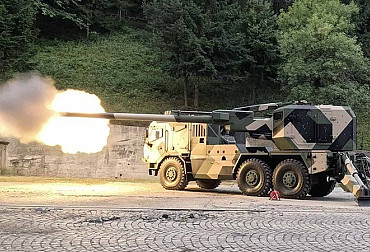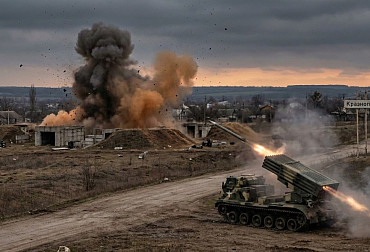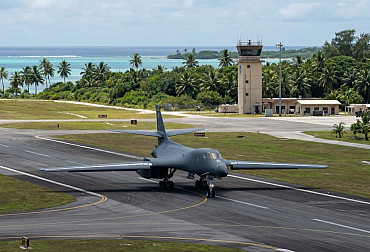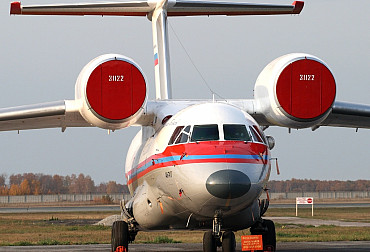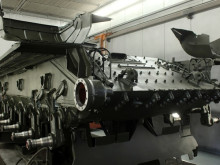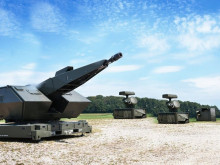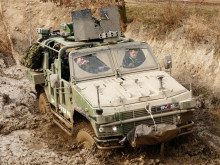The Mechanised Brigade will receive the coveted CV90 armoured vehicles. The acquisition process took more than four years
At its meeting on Wednesday, 24 May 2023, the government approved the purchase of 246 CV90 tracked infantry fighting vehicles (IFVs) from Swedish manufacturer BAE Systems-Hägglunds for CZK 59.7 billion incl. After more than four years since the launch of the original tender, which was also attended by vehicle manufacturers PUMA, LYNX and ASCOD, the Czech Army and its 7th Mechanised Brigade finally have a very real hope of replacing the morally and technically obsolete BVP-2s with modern equipment. The contract was signed the same day by Lubor Koudelka, Chief Director of the Armaments and Acquisitions Section, with representatives of the Swedish government and BAE Systems-Hägglunds. During the first day of IDET 2023 in Brno, a press conference was held at the BAE Systems-Hägglunds stand.
Video: Mechanized Brigade gets the coveted CV90 armored vehicles. The acquisition process took more than four years / CZ DEFENCE
Even critics of the acquisition project do not dispute that the Army needs modern equipment for its mechanised infantry in the form of new tracked IFVs, and on the contrary, they agree with its proponents that the rearmament is de facto unnecessarily late after a series of delays. The whole process was started seven years ago by approaching a number of global manufacturers. This was followed by a shortlist, including an evaluation of the first vehicle tests. From this came the Army's specific requirements for vehicle specifications, which were embodied in the terms of the competition.
The tender was launched in spring 2019 and four companies participated from the outset. The first communicated date for a possible outcome and contract signing was very optimistically set for the autumn of that year. However, there have been numerous postponements or delays for a number of reasons, which have subsequently been compounded by complications caused by the anti-pandemic measures during the covid-19 crisis. The PSM consortium with the PUMA vehicle withdrew from the competition after a few months because it was not feasible to modify the vehicle fitted with the unmanned turret to meet the Army's newly formulated requirement for a manned turret. Thus, for the next two years, only three companies participated in the tender: Rheinmetall, GDELS and BAE Systems-Hägglunds.
From a tactical and technical point of view, it can be said, and has been said repeatedly, that all the vehicles participating in the tender represented a potentially huge step forward for the Czech Army, new capabilities and a real entry into the 21st century. More important than the specification of individual types, from a certain point of view, were other parameters of the future contractual relationship with the supplier. In the first place, the question of industrial cooperation.
In the spring of 2021, the eagerly awaited tests of the so-called functional samples took place, during which it was verified that the vehicles meet all the requirements of the Czech Army. This was followed by several successively postponed deadlines for the submission of the final offer, which was finally received by the Ministry of Defence on 1 September 2021, not long before the parliamentary elections.
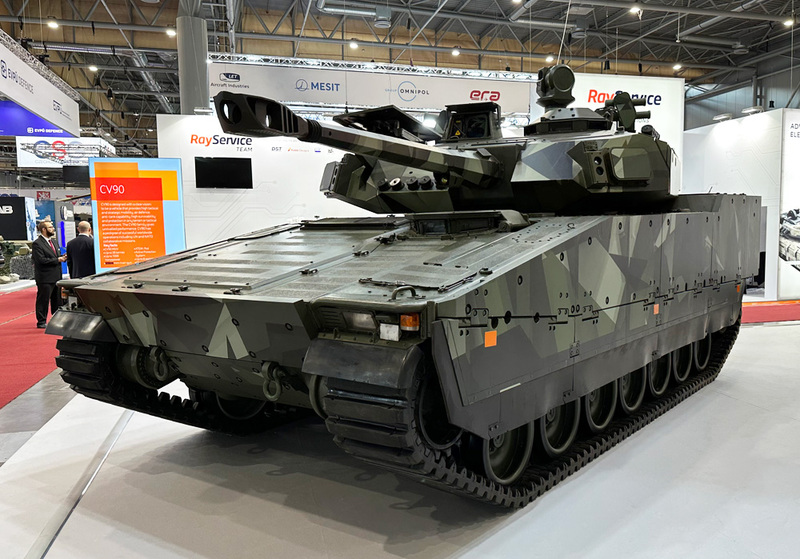 Picture: IFV CV90 at IDET 2023 | Michal Pivoňka / CZ DEFENCE
Picture: IFV CV90 at IDET 2023 | Michal Pivoňka / CZ DEFENCE
A number of even then government politicians criticized the tender for being too complex. Among the critics from the opposition at the time, mention should be made of today's Minister of Defence, Jana Černochová. According to the Armaments and Acquisitions Section, three world-class manufacturers of high-tech military equipment, companies from Germany, Spain (with close ties to the US) and Sweden (with close ties to the UK), failed to fully address the tender, in which they had to answer some 9,000 questions in their final bid. According to the MoD, none of the bids formally complied with the terms of reference, albeit in the order of dozens of deficiencies out of those 9,000 points, and the MoD eliminated all the bids; however, without also eliminating the bidders or cancelling the competition. The task was left to the new government.
One of the first things the new Defence Minister did after taking office was to commission a legal analysis of the tender situation. After a few months, Havel & Partners handed over this analysis to the Ministry - it showed the need to significantly modify the terms of the tender. The assumption had to be that all bidders would agree to the new settings. Otherwise, the tender would have been cancelled and the government would have looked for other options in the 7th Brigade rearmament project. This soon happened: the companies GDELS and Rheinmetall did not agree to the change. The tender was cancelled and the government of Petro Fiala immediately entrusted the Minister of Defence Černochová to negotiate the purchase of the CV90 type with the Kingdom of Sweden.
This decision was based on the military recommendation of the army that the CV90 type was fully suitable in terms of tactical and technical characteristics. There has been media speculation that this was in fact some kind of compensation to Sweden for the parallel decision not to proceed with the Gripen project and to start negotiations on the acquisition of US F-35 aircraft. The ministry rejected such an interpretation. It has now been challenged as nonsensical, for example by the former Chief of the General Staff, Army General Jiří Šedivý, in the Czech Television programme Events and Commentaries (25 May 2023).
The meeting was led by the team of the aquisition section's chief director, Lubor Koudelka. In December 2022, a Memorandum of Understanding was signed in which both the Czech and Swedish sides confirmed the basic parameters of the project, including a price guarantee (approx. VAT for 210 units of CV90 with rich accessories corresponding in all parameters to the military requirements formulated for the already cancelled 2019 competition) and the deadline for signing the purchase contract by 31 May 2023.
In early February, BAE Systems-Hägglunds submitted its final offer, which was evaluated by the MoD. The result was communicated to the government, which approved the purchase on 24 May, and the contract(s) (with the Swedish government agency FMV and the manufacturer) were signed promptly. According to an announcement by BAE Systems-Hägglunds President Tommy Gustafsson-Rasek at a press conference on the afternoon of 24 May at IDET 2023 in Brno, the army can count on deliveries of the vehicles between 2026 and 2030. A total of 246 vehicles will be delivered in seven variants. Gustafsson-Rask stressed that the Swedish side will honour the commitment of at least 40% share of the Czech companies in the order, and that relevant contracts have already been signed with five key partners. These are the state-owned company VOP CZ, Excalibur Army, VR Group, Ray Service and Meopta. Contracts with the other companies will be signed by the end of the year.
The failure to sign contracts with all subcontractors before signing the purchase agreement has been criticised by, for example, AOBP President Jiří Hynek, who also has reservations about the absence of a contract for vehicle servicing. The ministry informed the government in January that the service contract would be negotiated and concluded separately.
On the total price of CZK 59.7 billion and the original commitment to keep the amount of CZK 51.6 billion, the MoD says: "Because of the increase in the number of vehicles in demand, the price is of course higher than the announced CZK 51.6 billion incl. However, the price per unit price of the vehicle has been respected and is now even more advantageous for the Ministry."
The CV90 vehicles are intended for the mechanised battalions of the 7th Brigade. The 74th Mechanised Battalion from Bučovice should be the first to be armed with them, during 2026. "The acquisition of infantry fighting vehicles is a significant milestone in the construction of the heavy brigade and also in the modernisation of the army and strengthening of our defence capability," said Jana Černochová about the signed contract. A related acquisition project is underway in Slovakia. In addition to the advantage in terms of the purchase price of the vehicles, this will open the way for both countries and their armed forces to cooperate closely in the training, operation and maintenance of CV90 vehicles, which are deployed by other alliance partners such as Sweden, Finland, Denmark, Norway, the Netherlands and Estonia. CV9040C vehicles are also heading to Ukraine as part of Sweden's significant military assistance to the country, which has been resisting Russian aggression for more than a year.
The announcement of the signing of the contract for the CV90 was accompanied by information about the start of negotiations for the acquisition of Leopard 2A8 tanks, as part of a joint purchase with Germany for the needs of the Bundeswehr and the Army, which commented on social media saying: "We have arrived! An agreement has been signed for the delivery of CV90s, modern Swedish armoured vehicles. Together with Leopard 2 tanks, they will form the basis of a modernised heavy brigade, which is the foundation of the army as a whole. The process has taken many years, but it has been completed!"
Regarding the acquisition of the CV90 BVP, we asked Brigadier General Zdeněk Mikula, Commander of the 7th Mechanised Brigade, about the following:
What does the conclusion of the contract for the purchase of the CV90 IFV mean for the 7th MB?
It is a key step for us in the construction of a heavy mechanized brigade. We still have a long way to go before we reach full operational capability, but signing the contract for the CV90 is a huge motivation for our soldiers. I personally see it as a very positive thing that this is an operationally proven vehicle and we can share the experience of its state-of-the-art version with other users within the Alliance.
How do you see the increase in the original number of CV90s from 210 to 246?
The acquisition of backup for key combat equipment has long been underestimated. Having spare vehicles is absolutely critical and NATO requires us to do so. These vehicles were originally envisaged as an option, but the war in Ukraine has clearly shown that what we do not have in our backyard simply does not exist.
With the increased number of vehicles, will a certain number of them be dedicated to the use and training of active reserve troops?
The Active Reserve of our manoeuvre battalions have to train with the same equipment that the rest of the battalion is equipped with. This increase in the number of vehicles is an absolutely ideal way to provide for the training needs of the Active Reserve while having vehicles available to supplement broken down vehicles or to cover combat losses.











